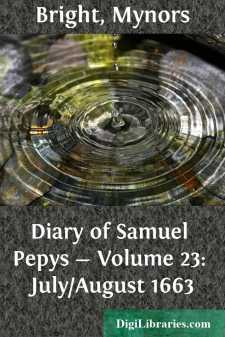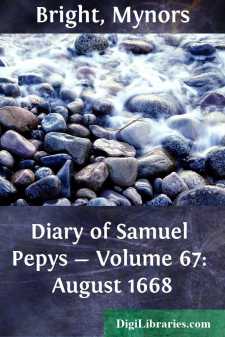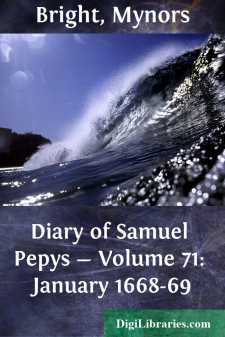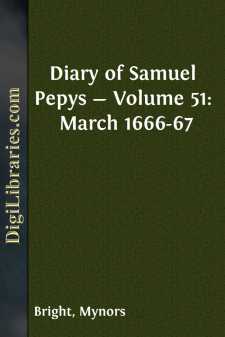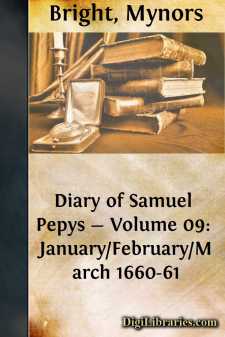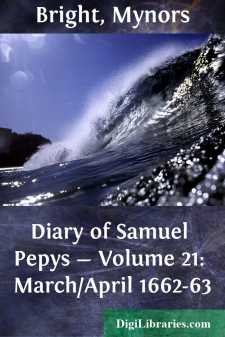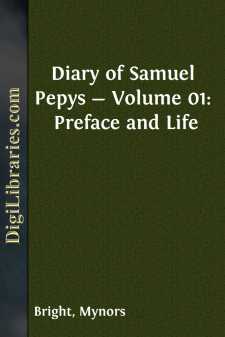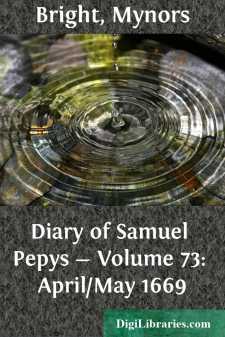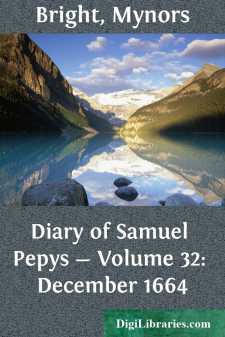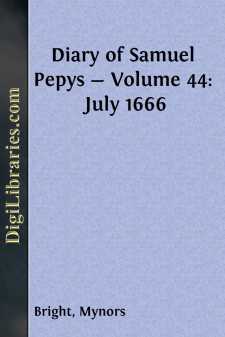Categories
- Antiques & Collectibles 13
- Architecture 36
- Art 48
- Bibles 22
- Biography & Autobiography 813
- Body, Mind & Spirit 142
- Business & Economics 28
- Children's Books 17
- Children's Fiction 14
- Computers 4
- Cooking 94
- Crafts & Hobbies 4
- Drama 346
- Education 46
- Family & Relationships 57
- Fiction 11829
- Games 19
- Gardening 17
- Health & Fitness 34
- History 1377
- House & Home 1
- Humor 147
- Juvenile Fiction 1873
- Juvenile Nonfiction 202
- Language Arts & Disciplines 88
- Law 16
- Literary Collections 686
- Literary Criticism 179
- Mathematics 13
- Medical 41
- Music 40
- Nature 179
- Non-Classifiable 1768
- Performing Arts 7
- Periodicals 1453
- Philosophy 64
- Photography 2
- Poetry 896
- Political Science 203
- Psychology 42
- Reference 154
- Religion 513
- Science 126
- Self-Help 84
- Social Science 81
- Sports & Recreation 34
- Study Aids 3
- Technology & Engineering 59
- Transportation 23
- Travel 463
- True Crime 29
Diary of Samuel Pepys - Volume 23: July/August 1663
by: Mynors Bright
Categories:
Description:
Excerpt
DIARY OF SAMUEL PEPYS.
JULY & AUGUST
1663
July 1st. This morning it rained so hard (though it was fair yesterday, and we thereupon in hopes of having some fair weather, which we have wanted these three months) that it wakened Creed, who lay with me last night, and me, and so we up and fell to discourse of the business of his accounts now under dispute, in which I have taken much trouble upon myself and raised a distance between Sir G. Carteret and myself, which troubles me, but I hope we have this morning light on an expedient that will right all, that will answer their queries, and yet save Creed the L500 which he did propose to make of the exchange abroad of the pieces of eight which he disbursed. Being ready, he and I by water to White Hall, where I left him before we came into the Court, for fear I should be seen by Sir G. Carteret with him, which of late I have been forced to avoid to remove suspicion. I to St. James's, and there discoursed a while with Mr. Coventry, between whom and myself there is very good understanding and friendship, and so to Westminster Hall, and being in the Parliament lobby, I there saw my Lord of Bristoll come to the Commons House to give his answer to their question, about some words he should tell the King that were spoke by Sir Richard Temple, a member of their House. A chair was set at the bar of the House for him, which he used but little, but made an harangue of half an hour bareheaded, the House covered. His speech being done, he came out and withdrew into a little room till the House had concluded of an answer to his speech; which they staying long upon, I went away. And by and by out comes Sir W. Batten; and he told me that his Lordship had made a long and a comedian-like speech, and delivered with such action as was not becoming his Lordship. He confesses he did tell the King such a thing of Sir Richard Temple, but that upon his honour they were not spoke by Sir Richard, he having taken a liberty of enlarging to the King upon the discourse which had been between Sir Richard and himself lately; and so took upon himself the whole blame, and desired their pardon, it being not to do any wrong to their fellow-member, but out of zeal to the King. He told them, among many other things, that as to his religion he was a Roman Catholique, but such a one as thought no man to have right to the Crown of England but the Prince that hath it; and such a one as, if the King should desire his counsel as to his own, he would not advise him to another religion than the old true reformed religion of this country, it being the properest of this kingdom as it now stands; and concluded with a submission to what the House shall do with him, saying, that whatever they shall do, says he, "thanks be to God, this head, this heart, and this sword (pointing to them all), will find me a being in any place in Europe." The House hath hereupon voted clearly Sir Richard Temple to be free from the imputation of saying those words; but when Sir William Batten came out, had not concluded what to say to my Lord, it being argued that to own any satisfaction as to my Lord from his speech, would be to lay some fault upon the King for the message he should upon no better accounts send to the impeaching of one of their members....


